Do you have a desire to open own business, you want to help people - have your own dental office. There will be a lot of work, but all of it is needed and the future functioning of the office will only benefit everyone.
What documents are needed to open a dental office?
The first thing you need to do is have all the documentation on hand; it’s impossible to open a dental office just like that.
- Registration of an entrepreneur – private or legal entity;
- If you are registered as an individual, you need to register for tax purposes at your place of residence, if as a legal entity, you need to register for tax purposes at your location;
- Occupation license required medical activities. To obtain it, an application is submitted, for legal entities - the name of the company, form of organization, location, addresses of the places where the activities will be carried out, state registration number of the legal entity and documents that confirm this fact. For individuals– Full name of the entrepreneur, addresses of places of licensed activities, identification document, record number state registration entrepreneur and data confirming the fact of inclusion in the only state register;
- Tax identification number, data on registration with tax authorities;
- Licensed type of medical activity;
Attachments to documents:
- Copies or originals of constituent documents approved by a notary;
- Confirmation of payment of the state fee for consideration of the license application;
- Confirmation of a license for ownership of buildings, premises, equipment for medical activities;
- Copies of educational documents, educational documents of specialists;
- Copies that confirm the entrepreneur’s work experience;
- Registration certificates and certificates for the use of specialized equipment - copies;
- Copies confirming the qualifications and education of workers servicing specialized medical equipment, or an agreement with an organization that has a license to perform such work;
- Conclusion of the sanitary-epidemiological inspection on compliance with the rules of medical practice - copy.
Copies of documents must be certified by a notary; if this is not done, provide the originals.
Registration of permits for opening a dental office
A dental office is a responsible occupation, therefore it is necessary to have all permits, without exception.
You must provide consumer supervision with:
- BTI plan;
- Explication;
- Certificate of ownership of the premises;
- Contract for washing clothes;
- Examination of the sterility of water, washings, and air.
- Agreement on disinfection of ventilation and air conditioning systems;
- Agreement for the disposal of fluorescent lamps and medical waste;
- Creation of the necessary microclimate and lighting.
You also need to obtain permits from the fire department.
- TIN certificate;
- Certificate of ownership or lease of premises;
- Take a course and receive a certificate in fire safety skills;
- Fire safety order;
- Evacuation plan;
- Fire extinguisher, and confirmation of fire alarm installation;
- Measure resistance and draw up a protocol;
A separate license is issued for each area of medical activity; documents must be submitted to the health care supervision in accordance with the law.
Selection and preparation of premises for dentistry
A dental office is not just a room where a dental chair is located - it is a whole complex that must function in accordance with all the rules. Therefore, selecting and preparing premises for dentistry is not such an easy task.
You have a ready-made business plan in your hands, money is also in your account, and ready to be spent. Where to start?
Firstly, this is a room on the ground floor, not far from transport routes and stops; if you bought (rent will cost much more) residential space for dentistry, you need to transfer it to a non-residential property. To do this, you need to contact the city architecture department, where you will be given a list of organizations from which you need to obtain Required documents and certificates. Based on the information, the architectural bureau issues permission and planning. After approval of the project, you can begin work, but you will have to visit all authorities again for subsequent inquiries.
According to the standards, the premises for a dental office must be at least 30 sq.m. Dental unit room – 14 sq.m., 10 sq.m. hall, for receiving and waiting for patients, 5 sq.m. toilet. The depth of the room is 6 m.
Also, you may need additional rooms, which will turn your office into an entire dental clinic. But this will make your business move forward even faster.
- Sterilization room – at least 6 sq.m., required if you have more than three dental chairs;
- X-ray room – 15 sq.m;
- Orthodontist and orthopedist office – 15 sq.m;
- Pediatric dentistry office - 15 sq.m;
- Surgeon's office – 15 sq.m;
- Dental technician laboratory – 15 sq.m;
- Warehouse and other auxiliary premises – from 30 sq.m.
Equipment for dental office
The equipment item takes second place after the cost of preparing the premises, so it needs to be taken very seriously, especially since your dental office will operate for more than one year.
All communications, water, air, sewerage must be connected to the chair under the floor; this work must be done at the highest level so that the floor does not have to be re-done.
Dental equipment must comply with all sanitary standards.
- The most important thing in a dental office is the chair. Modern dental chairs have at least four sleeves - for an air and water gun, a micromotor with tips, a turbine and an ultrasonic scanner;
- Tips are additional and replaceable. Kits must always be available; unforeseen circumstances can happen at any time;
- Compounds for filling, chemical and hygiene products;
- Dental instruments;
- Solar curing lamps;
- Autoclave for processing instruments;
- Sterilizer;
- Cabinets for instruments and medications;
- X-ray unit and other additional equipment.
The office equipment must be of high quality; it is better to pay more at first than to spend even more later and have disruptions in the office’s work schedule. You also need to remember about equipment maintenance, which is carried out by specialists.
Having your own dental office is a socially useful and profitable business. If you approach the issue responsibly, your business will be successful and progressive.
10 errors when opening dental clinic
Opening your own dental clinic is one of the most profitable ways to invest money. At the right approach the clinic pays for itself in 2-3 years, after which it begins to generate constant profit (the profitability of the best Moscow clinics is 40-45%).
That being said, any dental business owner will tell you that running a clinic is not easy. Prices for materials and equipment are rising, clients are becoming more and more demanding, and competitors' offices are opening more and more often.
Despite these factors, the market dental services is far from saturation: out of 1,200 Moscow offices, only a few can compare with European ones in terms of the range of services offered and the class of equipment. Accordingly, in the regions there are even fewer clinics of this level. IN major cities There are many more small offices than clinics, so the range of services offered is even more limited.
Thus, our own dental clinic is profitable business, in which there are a large number of free niches, but when creating it, the owner will face obvious and not very difficult difficulties.
What are the 10 biggest mistakes clinic owners make when opening clinics?
Mistake 1. Opening a clinic without entrepreneurial skills
As a rule, people who open dental clinics are dentists who want to open their own business. Apart from the ability to heal and the desire to make money from it, they do not have the slightest entrepreneurial skills. The clinics they open mostly close due to bankruptcy.
The reason for their failure is that their business idea is described in one phrase: “I will treat well and earn a lot of money.” Unfortunately, the phrase is fundamentally incorrect.
Any business, including dental, is a system. A service, even if it is of excellent quality, is only an element of the system. The entrepreneur's task is to build the entire system.
There is a huge difference between a successful dentist and a successful businessman. A successful dentist is a person who knows everything about the business he is engaged in - that is, dental treatment. A successful businessman is a person who knows everything about the clients to whom he provides services. What they need, what they are willing to pay for, how convenient it is for them to visit the clinic.
When a clinic is created by an experienced entrepreneur who has decided to invest money profitably, then from the very beginning he views dentistry as a business. Such clinics are much more successful and stable.
A dentist can also build a successful business if he forgets about professional activity and get ready to build an integrated business system.
Mistake 2. Concentrating only on medical procedures Let's say that your clinic provides excellent treatment, but the clinic may not make any money at all if:
If you don’t have competent advertising, and patients go to other clinics.
If there is an administrator on the phone who cannot answer any question correctly, and more often than not smokes on the porch.
If you have spent all your money on expensive equipment, but the types of services it provides are not in demand.
If you have a small and dirty room.
If the patient cannot receive full spectrum services due to lack of necessary materials.
If for errors in management accounting you pay fines and penalties.
If you receive penalties from regulatory authorities for violations of licensing requirements.
If you set your prices too high and patients leave.
If you bet too low prices and you can’t pay for the clinic.
If you do not have strict records of work performed and consumables, and the money for them does not go to the cash register.
This list can be continued for a very long time. As you can see, the ability to heal well is not everything. It is necessary to ensure a continuous conveyor of dental services.
Set up a marketing mechanism in such a way that in summer and winter, in clear weather and in rain, patients line up at your clinic. All parts of the conveyor must be debugged by you personally. They must operate continuously and have no financial leaks. Only then will the clinic be profitable.
Mistake 3. Lack of a well-thought-out business model The business model does not view the clinic as medical institution, but as a money-making enterprise. You describe all the channels for money coming in and all the channels for spending money. If you lose sight of any cost element, the clinic will go bankrupt very quickly, so there is no need to rush at this stage.
You need to write down in detail:
Range of services and pricing procedure
Functions and job descriptions employees,
Models wages,
Work technologies
and the procedure for patient care;
The more detailed you describe the clinic’s business model, the faster and more accurately you will make decisions about choosing premises, purchasing equipment and hiring staff.
If production processes are not scheduled, then any failure in work turns into scandalous showdowns and a search for someone to blame. This takes time, and time, as you know, is money.
Mistake 4. Trying to do everything yourself
In a relationship service personnel It should be taken into account that the share of costs for each additional employee very high. This means that hiring any additional person directly reduces the clinic's profits.
In this case there is a problem. On the one hand, some non-core work must be performed (for example, accounting), on the other hand, maintenance costs become disproportionately large.
In this case, it is necessary to use outsourcing - the use of other people's resources.
There is a simple rule of outsourcing - transfer everything that customers do not pay you for to other companies.
The list of services that are recommended to be outsourced is quite large:
Accounting
Computer support
Maintaining a website on the Internet
Cleaning the premises
In this case, you simultaneously receive higher quality, since you entrust the work to professionals, and reduce costs, since professional services take less time.
Mistake 5. Renting premises for a clinic
If you compare payments on a loan to purchase premises with payments rent, then it’s easy to see that rent loses on all counts.
The loan is taken for a clearly defined period and all payments are transparent. After repaying the entire loan, you become the owner of the premises and can dispose of it as you wish. Including the option that you can rent it out yourself if problems arise with the clinic. As a result, after spending a certain amount, you will eventually become the owner of the premises.
With a rental, you pay a price at the landlord's discretion and after lengthy payments, you could end up on the street. In addition, changing premises may lead to the loss of established clientele. As a result, after spending approximately the same amount, you will eventually find yourself without a room.
To summarize, we can say that when renting premises in the long term, you are simply throwing money away.
Mistake 6. Underpricing
The most important decision you must make is choosing a price segment. The fact is that very often people who are far from business make mistakes in determining what is considered “expensive” and “cheap”. The fact is that high-quality treatment, by definition, cannot be cheap. For good treatment needed good doctors, good equipment and good materials, all this is very expensive.
A high price for a service does not mean that the clinic is “expensive”; it means that the price of the service includes high quality. If you are sure of this, then you can safely set a high price. Patients will come in a continuous stream, and bring all their relatives and friends. Trying to save on treatment at first will actually give you more patients, but after a while they themselves will no longer come to you and will advise everyone they know against it.
Mistake 7. Lack of a financial “airbag”
There was a sewerage accident, your administrator quit, you were fined because of an error in financial statements, in front of the entrance to the clinic, repairs to the heating main began. All these events increase costs and reduce the number of visitors, but you cannot compensate for them high prices. Patients will leave.
The best and richest clinic, which patients no longer visit, will instantly go bankrupt. To prevent such situations, you must include in the price some amount of insurance, an “airbag”. With such insurance, you can cope with an unpleasant situation with minimal losses. It is important that all these unpleasant events do not affect patients in any way.
Finally, adjust all your calculations for inflation. Material prices are slowly increasing, and this should be reflected in the prices of your services.
Mistake 8: Pricing games with patients
The pricing game is what they say on the phone minimum price, and after treatment they bill for a completely different amount. The mistake is that the patient will believe that he is being deceived.
The only way to work correctly with prices is for the administrator to tell you over the phone only the minimum price for installing a filling, adding that depending on the condition of the tooth, the price may change. During the visit, the doctor offers the patient various options treatments with an explanation of the advantages and disadvantages of each.
The patient himself chooses what exactly he pays money for. Only in this case will you look like a reputable and reliable clinic in the eyes of the patient.
The apparent complexity of this approach, however, will save you a lot of time and nerves that you can spend dealing with indignant patients.
Mistake 9. Insufficient attention to prevention
The traditional fear of the dentist has led to patients trying to come to the clinic as little as possible. Usually, when painful sensations appear.
In the West, the attitude is exactly the opposite. Most Americans regularly monitor their oral health and visit a hygienist twice a year for dental plaque removal and other procedures. preventive procedures. This practice begins at the age of five.
Although the demand for hygiene services is currently minimal, it should be borne in mind that the situation is changing and those clinics that work competently with patients will receive high and stable income in this area of services.
To do this, it is necessary to invest in organizing training in oral hygiene, nutritional recommendations, and selection of oral care products.
Mistake 10. Passive attitude towards the patient
Typically, clinics view patient visits as one-time and independent. But this is a deep misunderstanding of the patient’s psychology.
The patient wants dentists, so to speak, to “think for him.” This means that the initiative for the visit must come from the clinic. One time a patient came and was treated full examination oral cavity and prescribed some treatment and preventive health maintenance plan. And then the patient regularly receives an invitation by mail to preventive examination or carrying out preventive maintenance.
Maintaining the oral cavity in excellent condition, especially in old age, requires the efforts of doctors of various specialties. It is necessary to coordinate the efforts of these doctors in one direction. Therefore, there must be a doctor who is assigned to the patient (“family doctor”), and he already directs the entire course of treatment.
The clinic provides the patient with information materials, procedures, and recommends certain aesthetic procedures. The same applies to all family members.
This practice has existed in the West for decades. Regular invitation cards are sent to patients, special family visits are organized, and special “family” accounts are set up to pay for services.
A faceless patient in a standard clinic becomes a welcome guest in a family clinic. They call him by name, remember his calls, follow developments, recommend certain procedures based on individual characteristics.
Statistics show that patients of family clinics rarely go to other clinics. Therefore, the high costs of organizing family clinic will pay off with a constant flow of patients over many years.
We will consider a more detailed analysis of these mistakes and other techniques for increasing the profitability of a dental clinic in the free online training “How to open a dental clinic.”
Entrepreneurs have been asking themselves this question for years. For a business to be profitable, you need to take into account a number of subtleties and risks.
Capital investments: 1,100,000 rubles.
Payback: 1.5 – 2 years.
Medical services are a priority expense for any reasonable person.
Everyone has teeth, and they require regular care.
Even if all sanitary and hygienic standards are observed, inspection and some cosmetic procedures are needed in the oral cavity at least once or twice a year.
Because reflections how to open a dental office, make sense when an entrepreneur wants to open a profitable and in-demand business.
However, it is important to understand that organizing a business will require a lot of time, effort and money.
The owner of a dental establishment must take into account all the specific requirements for personnel, equipment, location and resolve the issue of obtaining a license.
Let’s discuss in more detail what should be done and how.
What formats for providing dental services exist?
A dental office is only one form of providing services to the population.
There are three types in total:
An ordinary government clinic.
As a rule, the target audience has a low or middle income level.
Most of the services are provided free of charge.
Paid Consumables, pain relief and other additional points.
Private clinic.
The income level of visitors to these establishments is already average and above average.
Services are provided exclusively on a paid basis, with the exception of promotions and free consultations in rare cases.
Private dental clinics provide an integrated approach to treatment.
To open such a business, very large financial investments are required.
Dental office.
As in private clinics, the income level of the main target audience is average and above average.
The difference is that the territory of such an institution is small, designed for 1-2 doctors.
Due to the shortened list of services provided, they are not in such demand as large clinics.
However, competent implementation of the idea of opening such a mini-format establishment will bring profit to the owner.
What are the possible risks in such a business?
Entrepreneurs must not forget: a dental office is not just a business, but work in the medical field.
This means that it is associated with a number of risks.
The owner must be aware of them and plan how to minimize these risks before opening the establishment.
All necessary licenses and permits have not been obtained.
It is fraught with fines and even closure.
Low demand for services.
Leveled out by thoughtful marketing strategy and selection of competitive advantages.
Lack of prestige.
Private dental clinics set high prices for their services.
Accordingly, they must give customers not only quality, but also a sense of prestige.
Poor selection of employees.
In the service sector, especially those with prestige claims, personnel decides a lot.
Laziness, impolite attitude, and incompetence can significantly reduce the number of your clients.
Prices are too high or too low.
An entrepreneur should analyze the market and competitors not only before opening a dental office.
This must be done constantly to adjust your actions.
Marketing strategy for a dental office
The potentially high profitability of the idea of opening a dental office is “to blame” for high level competition.
Therefore, the future owner must pay due attention to the marketing strategy.
The main services provided by the dental clinic: treatment of dental cavities and oral diseases, prosthetics and dental implantation, alignment, cleaning and teeth whitening.
Competitive advantages of a dental office
A dental office may have the following competitive advantages:
- affordable prices for services;
- good location with good transport links;
- convenient working hours;
- special conditions for preferential categories population;
Dental office advertising
To advertise a dental office when you have just decided to open it and people don’t know about you, you can use the following methods:
- Introduction of discounts for “inconvenient” times (for example, Sunday evening).
- Placing business cards and leaflets in places where the target audience gathers.
- Creation of a website with services, price list, reviews.
- “Promotion” of doctors who work in the office. For this they can give free consultations via the Internet, participate in forums and medical meetings.
- Carrying out periodic promotions, discounts, special offers.
Stages of implementing the idea of opening a dental office
You can open a dental office if you approach the implementation of your plan step by step.
Business registration
Obtaining a license to operate is an integral part of the idea of opening a company providing dental services.
Also, the businessman himself must be registered as a private entrepreneur or open an LLC.
To obtain all required permits, a dental office must comply with regulations regarding location, design, equipment, and staff.
Selecting a location
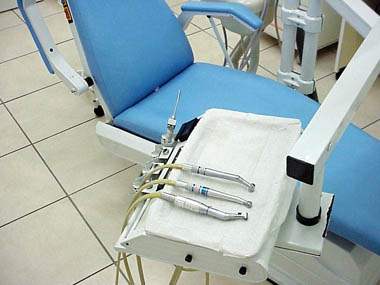
The following requirements apply to the location of the dental office:
- Each employee (read: chair) should have at least 14 m2 of working space.
- The location in the center is prestigious, but it is better to focus on the population density.
- It is advisable to open an office on the ground floor of the building or in a separate room.
- You must have all communications in place.
- A successful transport interchange will be a big plus.
- Ensure compliance with all SES and fire safety standards.
Dental office equipment
A big bet is placed on the quality of equipment.
It must not only correspond to the level of prestige of the institution and fulfill its functions.
But also comply with certain sanitary and hygienic standards, without which the office has no right to receive clients.
Let's look at the list of basic equipment that you need to buy to open a dental office.
- In addition to the basic set of tips, it is worth purchasing an additional set.
- The list of consumables includes various hygiene products, chemicals, mixtures for fillings.
You can’t open an office without the main thing – the chair.
You should not skimp on it under any circumstances.
Choose equipment from a reliable supplier with a complete set.
Also, do not forget that you will have to spend at least 2-3 thousand rubles on its maintenance.
For the basic configuration you will need to have at least 520,000 rubles.
Recruitment of personnel for a dental office
To open a small company, it is enough to hire 6 people: doctors, their assistants, an administrator and a nurse.
Their potential salary is included in your budget at the planning stage.
Education and work experience for doctors plays not only the role of prestige, like equipment, but is a prerequisite.
Only if the dentists in your establishment have necessary documents and practical experience of at least 5 years, you will be able to obtain a work license.
But you can hire a person without work experience for the role of assistant.
But nursing education or certification is also required.
An entrepreneur can delegate accounting concerns to , since in this industry the permanent presence of an accountant on staff is not necessary.
This number of employees is sufficient to ensure the daily operation of the company.
How much does it cost to open a dental office?
The main cost items were discussed in detail above.
Let's imagine the capital investment to open an establishment in the form of a table.
Capital investment in start-up
To open a dental office, an entrepreneur needs to have substantial capital.
Such a business is more accessible than opening a private clinic, for example.
More specifically, we are talking about the following expenses and amounts:
Of course, these calculations are compiled very roughly and tentatively.
Experienced entrepreneurs, who know first-hand how much it costs to open such an establishment, cite the amount as 1.5-2 million rubles.
If you are serious about opening your own dental office,
We invite you to watch a video with a list of main mistakes
in running this type of business, in order to prevent them from entering your business:
Profitability and payback of a dental office
Everyone knows that dentistry is one of the most prestigious and profitable branches of medicine.
There is always a need to treat teeth.
And this is a procedure that cannot be performed at home.
Because reflections how to open a dental office, relevant at any time.
According to statistics, within 1.5-2 years you will be able to recoup your investment and receive high profits.
Useful article? Don't miss new ones!
Enter your email and receive new articles by email
How much does the equipment cost? How to write a business plan and avoid failures? You will get answers to these and other questions in this article.
A private dental clinic can bring a decent profit only with a competent approach to organization and development strategy. Advice from experienced entrepreneurs will help you avoid the most common mistakes.
Before we begin
The desire of a good and experienced dentist to open his own clinic or office is natural and logical. Freedom of action, decent payment for services provided are worthy arguments. But, organizing a thriving business requires a sober assessment of the initial data: competition, demand for services, necessary start-up capital, project implementation deadlines, payback and a host of other issues.
A business plan must be drawn up by a competent manager with experience in organizing dental clinics. An aspiring entrepreneur must think through the prospects for development, expand the number of services, formulate criteria for success and strategic goals of his brainchild.
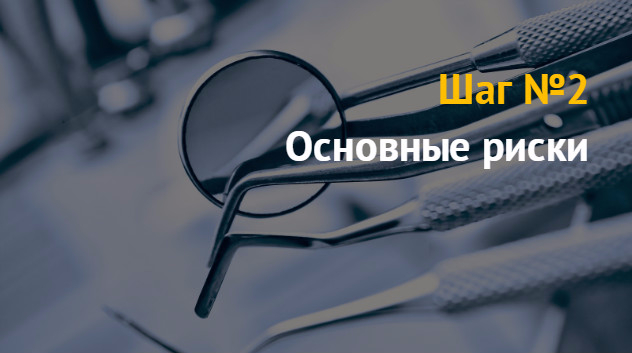
Main risks
According to statistics, about 60% of new dental clinics close within 1.5 years of operation.
If the business plan contains only an outline from a physician's point of view, and does not include the analysis of a professional manager regarding the risks, the real costs of the organization, the marketing plan and pricing features, survive and achieve sustainable growth new clinic can not.
Any business aims to make a profit. But, in rendering medical services this should not turn into the main, much less the only, goal. Employees and partners who are united only by the idea of enrichment will leave for more successful competitors at the slightest difficulty. On the other hand, the mission to do good should not compete with the natural desire to receive decent payment for the services provided. Wise approach and balance in personnel policy, a common vision of strategic goals and reasonable distribution of profits will avoid the collapse of the team.
It's very easy to lose your reputation. Medical error can destroy a business and deprive a dentist of his license. Strict adherence to sanitary standards and adherence to the established treatment procedure in private clinic– the most important tasks.
“Step-by-step instructions on how to open a dental office”
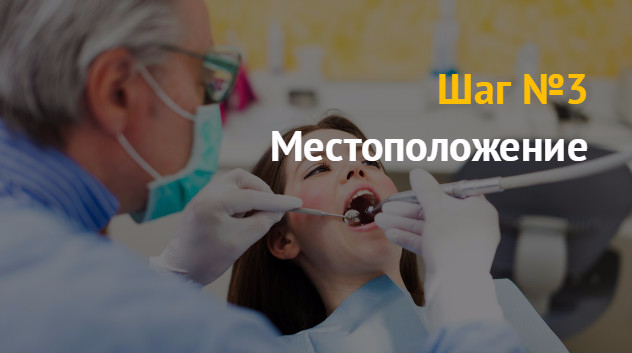
Location
The business or residential area you choose for your dental clinic does not play a special role. Look for a room nearby with metro and bus stops. Both an administrative building and an apartment on the first floor of a residential building are suitable.
Rent or buy? When answering this question, consider the following nuances:
- Not all premises meet sanitary standards and comply with fire safety regulations.
- The landlord may allow redevelopment of the premises. How much will be spent on major repairs?
- A license to provide medical services is issued for the premises. If the lease term is short and there is a possibility of refusal to renew it, you will have to start all over again in the new premises.
Perhaps buying and redeveloping your own real estate will end up being cheaper?

Premises requirements
The premises, which are classified as residential, can be converted into non-residential. Savings in redevelopment and repairs are unacceptable. Order an architectural and technological project from a company with an impeccable reputation. All project documentation must be agreed upon:
- with expert service;
- consumer supervision;
- architectural planning department;
- fire supervision.
To comply with the standards, you will have to replace the sewerage and water supply, wiring and ventilation. All communications are laid under the floor and connected to the dental chair.
There are strict rules regarding dental office space. Before searching for premises, it is necessary to clearly imagine the layout of the premises, think about the location of equipment and utility rooms. Also, there are additional regulations in certain regions.
The general standards established by consumer supervision are as follows:
- For one dental unit, the office area must be at least 14 m².
- For each additional dental installation in meters, 7 m² is added.
- Hall – up to 10 m².
- Bathroom – up to 5 m².
When planning further expansion, take into account in advance and include in the project standards for other types of premises:
- Sterilization room for the operation of three or more dental units – 6 m².
- X-ray room – 11 m².
- X-ray developing room – 6 m².
- Offices: children's, orthopedist, orthodontist, implantology - 15 m² each.
- Auxiliary premises – 30 m².
For patient comfort, it is advisable to provide a separate office for each chair.

Equipment
Equipment for a private dental office is the most expensive item of initial investment. The kit is formed according to sanitary rules:
- Complete chair - about $10,000, service maintenance– about 100 dollars per month.
- Radiovisiograph - about $8,000.
- A set of additional replacement tips costs about $1,500.
- Tools – $1,000.
- Solar reflective lamps - over $300.
- Apex locators – $1,000.
- Autoclave for antibacterial treatment of instruments – $2,000.
- Sterilizer – over $1,000.
- Furniture and cabinets for drugs and tools - about $5,000.
- Filling composition, hygiene products and others chemical substances– about $1,500 (with monthly replenishment).
The total is $31,400.
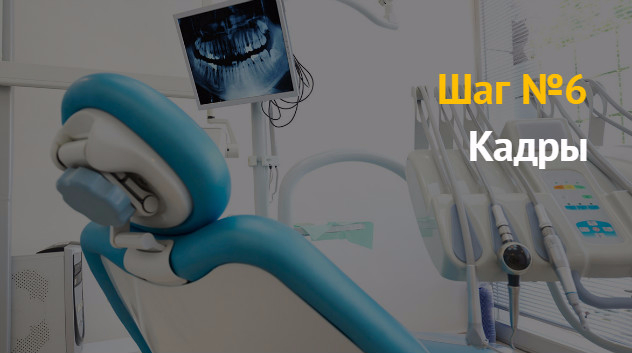
Personnel
At least one employee is required for each area of dental services on staff. To obtain the right to provide therapeutic services, your employees must have a certificate, intern and resident diplomas. Also, a minimum work experience of 5 years is required. If there is at least one employee on staff who meets these requirements, a license to provide services will be issued.
For full-fledged work, health workers with average vocational education. Holders of the Preventive Dentistry certificate have the right to assist doctors and provide hygiene services.
During the day, a dentist’s shift should not exceed 6 hours; similar standards apply for the work of an average dentist. medical personnel. When opening a clinic, immediately plan the number of employees to work in two shifts. Also, a full-fledged staff requires nurses and an administrator.

Documents and licenses
If you have the necessary education and experience, and plan to provide services yourself, you can register an individual entrepreneur. A license to provide medical services is issued only to a specific person.
If other licensed specialists will work in your office, it is advisable to form an LLC.
Registration required pension fund, order a seal, open a bank account and create a ledger.
Also, to issue checks, you must purchase a cash register and register it with the tax office. When purchasing a cash register, a service agreement is concluded.
After putting the premises into operation, obtaining an entrepreneur’s certificate, TIN and USRN, permission must be obtained from consumer supervision, fire inspection and health care supervision.
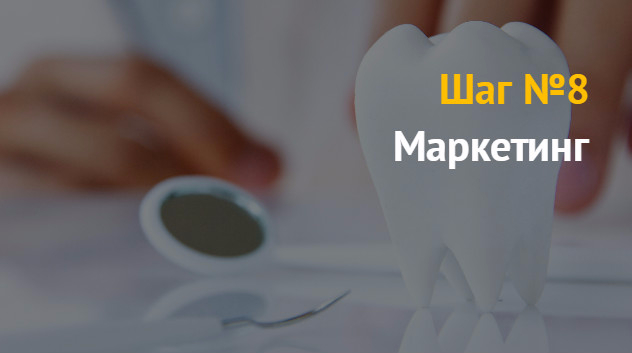
Marketing
A doctor with certain experience can obtain a license to provide dental services. Over the years of work, the dentist has formed a circle regular customers. Ask grateful clients to recommend you by offering Additional services or reasonable discounts.
Advertising, seasonal discounts and other dental techniques do not work or give the expected effect. The client will not come because of the promotion if his teeth do not hurt. Vivid and financially reasoned demonstration of feasibility regular visits doctor for preventive purposes may work. Show sincere concern for the client’s health - this always gives positive result and contributes to the popularity of the doctor.
The patient is not always able to realistically evaluate the professionalism and cost of the doctor’s services. The price, in the patient’s opinion, is too high and will force him to look for a cheap clinic. The cost of services must be clearly formulated and described in language that a lay person can understand.
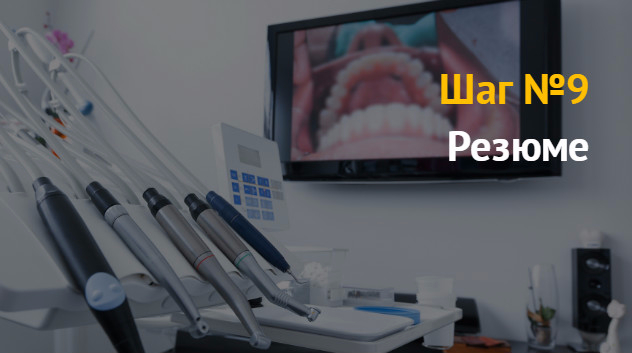
Summary
A private dental practice will generate decent income with competent management, the desire to provide services in the best possible way and constant improvement of service.
You can expect a return on investment within a few years. With stable operation, the yield is about 20%.








